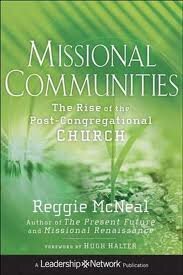Reggie McNeal, Missional Communities: The Rise of the Post-Congregational Church (Jossey-Bass Leadership Network Series). Jossey-Bass, 2011.
Prequels:
Referenced in: Missional Communities
LifeandLeadership.com Summary
This is the third of a series on the missional movement by Reggie McNeal, following The Present Future and Missional Renaissance. Here, McNeal describes various shapes of missional communities in both Europe and the U.S., and a few observations on how to become missional. It is collection of inspirational stories of how missional communities emerge and function, including:
- Missional Communities, European Style – Usually these are smaller units of 20-50 who embody the gospel in a neighborhood or other context. Examples include St Thomas in Sheffield and Valgmenighed Church in Denmark.
- Soma Communities: Missional communities as Organizing Architecture – a group of around one hundred missional communities in the U.S.
- Campus Evangelism UT: Missional Communities as Campus Evangelism Strategy
- Future Travelers – A group of megachurches which are attempting to catalyze missional movements of the future. Examples are Austin Stone and Community Christian Church.
- Mission Houston: Missional Communities for Spiritual Formation and Community Transformation – A community emphasizing spiritual formation through a process called Faithwalking to develop missional followers of Jesus, who then form missional communities.
Typical of the missional ethos, McNeal stresses their “post-congregational” nature. By congregational he means “a gathering place where geographically approximate adherents practice their faith.” This contrasts to the norm of the first three centuries of Christianity that was “mainly a street movement” taking place “primarily in homes and some suitable public places,” which equipped them for “Jesus-follower spirituality…a practice, a way of life.” (2) This movement
“demonstrated allegiance to Jesus primarily when they were away from their gatherings, engaged in lives that typically and routinely intersected with and inluded non-Jesus followers. The church represented a lifestyle that was radically different from its cultural surroundings but radically committed to the well-being of the people in the culture.” (3)
He suggests this orientation changed and the church “domesticated” due to the confluence of two factors: the establishment of state religion through the imperial edict of Constantine and the rise of the clergy class. These “combined to centralize and institutionalize the Christian movement,” where “people would demonstrate their devotion to the faith by participating in congregational activity, which centrally involve the worship service,” and “assenting to a set of doctrinal beliefs” and not so much the “lifestyle of counter-cultural sacrificial love of neighbor.” (3) This congregational church has taken on many forms, from Reformation era orders and practices to current “big box retail” megachurches. The missional communities he describes, however, represent the attempt to move back to incarnational expressions of Jesus’ presence in and around their immediate communities.
From the Publisher
Almost a decade ago, in his bestselling book The Present Future, Reggie McNeal talked about the growing phenomenon of post-congregational Christians, people who, for a variety of reasons, choose to pursue their spiritual journey outside the routines and rhythms of the congregational model of church that has dominated religious activity for centuries. This development has created ripe conditions to produce and to nurture a new life form of church that intersects people in the middle of life—in their homes, their workplaces, their leisure pursuits, their passions to help others.
In Missional Communities McNeal shows us this new form of church and how it differs in its rhythms, its celebrations, its activities, and its scorecard. He maintains that it is not for everyone, nor is it the replacement for centuries of church practice. But it is clearly a growing phenomenon that cannot be ignored. At the very heart of the book are stories about some of these new missional communities, each one illustrating a fresh and different chapter in God’s work in and through the church. The settings range from Europe to North America, from suburb to city to college campus, from neighborhood to workplace. McNeal presents these stories in the hopes of exciting the imaginations of those attracted to this burgeoning movement—whether they want to get started in their own distinctive way of doing missional community or want to be more missional in their traditional practices.
For all those thousands of churches and leaders who have followed Reggie McNeal’s bold lead, Missional Communities offers a vision of a new and vibrant life form in churches.
About the Author
Reggie McNeal is the missional leadership specialist for Leadership Network. Drawing on twenty years of leadership roles in local congregations and his work over the last two decades with thousands of clergy and church leaders, McNeal counsels local churches, denominational groups, seminaries and colleges, and parachurch organizations in their leadership development needs.
Leadership Network, a division of OneHundredX, seeks to accelerate the impact of 100X leaders. Since 1996, Leadership Network Publications has presented thoroughly researched and practical concepts from leading thinkers, practitioners, and pioneering churches.
***For additional information on this resource, including reviews, click the bookstore links. Check the reference at page top or the links below for resource guides on related topics.***
See Resources on Over 100 Areas of Ministry Leadership:


